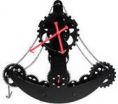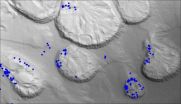(Press-News.org) WASHINGTON – Children as young as 3 are likely to say that things made by humans have owners, but that natural objects, such as pine cones and sea shells, are not owned, according to a new study published by the American Psychological Association.
"Determining whether an unfamiliar object is owned is very important because it shows us that young children can decide when they're allowed to take or handle something," said the study's lead author, psychologist Karen Neary, PhD, of Waterloo University in Canada. "This article provides the first evidence about how children judge the ownership of things based on whether those things are 'artificial' or 'natural.'"
A total of 131 children, ages 3 to 6 and mostly from white, middle-class families, were tested in five different experiments at their daycare or preschool. The findings are published online in the APA journal Developmental Psychology.
In the first experiment, 3-year-olds looked at pictures of five recognizable human-made objects (fork, teddy bear, ball, shoe, truck) and five familiar natural objects (leaf, shell, rock, branch, pine cone). The testers did not name the objects but asked each child, "Does this belong to anyone?" Children named the human-made objects as owned 89 percent of the time and natural objects as owned 28 percent of the time.
To ensure that the children weren't basing their judgments on personal experiences, such as owning a teddy bear, the researchers showed six photos of unfamiliar objects to a different group of 57 children, ages 3 to 5. Half of the objects appeared to have been made by people and the other half looked natural. They asked the children the same question: "Does this belong to anyone?" They also conducted a similar experiment with a separate group of 3- and 4-year-olds, but this time the testers told the children which objects were human-made or natural.
In one "unfamiliar objects" experiment, children of each age mostly viewed the natural objects as not being owned, but children younger than 6 were less consistent when asked if the synthetic objects belonged to anyone. However, in the second experiment, the 3- and 4-year-olds judged the human-made objects to be owned more often. This was because the children were told that they were human-made objects, the researchers said.
In a final experiment, the researchers questioned whether 4- and 5-year-olds based their judgments of ownership on the desirability of objects. They showed them a picture of a woman named "Sally" and two pictures of unfamiliar objects, one natural and the other human-made, and asked half the children, "Which one belongs to Sally?" Seventy-two percent of these children said the human-made object belonged to Sally. When they asked the other children which object Sally liked better, 47 percent said Sally liked the human-made object better.
"Although children thought Sally would like the natural objects just as much, they were still more likely to say that she owned the human-made objects," said study co-author Ori Friedman, PhD, also of the University of Waterloo. "It appears children's views of object ownership are not based on whether they think the object is more likeable."
It was difficult to judge if the children consistently considered the objects' origins in determining whether they were owned, according to the researchers. Nonetheless, when the children learned which objects were artificial or natural, they were more likely to say unfamiliar artificial objects were owned.
"It's possible young children are more likely to think artificial objects are owned and natural ones are not because of their experience with objects," Friedman said. "For example, if the object is made of plastic, like a toy, then they assume it most likely belongs to someone. They may transfer that assumption to all things made of plastic."
They also might reason that artificial objects are likely to be owned because they are made by people and natural objects are unlikely to be owned because they are not, according to the researchers.
"The current studies show that young children have differing expectations about the ownership of all kinds of objects, both familiar and unfamiliar, which is contrary to previous research that suggests children view natural objects as similar to artificial ones," Neary said.
INFORMATION:
The American Psychological Association, in Washington, D.C., is the largest scientific and professional organization representing psychology in the United States and is the world's largest association of psychologists. APA's membership includes more than 154,000 researchers, educators, clinicians, consultants and students. Through its divisions in 54 subfields of psychology and affiliations with 60 state, territorial and Canadian provincial associations, APA works to advance psychology as a science, as a profession and as a means of promoting health, education and human welfare.
Article: "Artifacts and Natural Kinds: Children's Judgments About Whether Objects Are Owned," Karen R. Neary, PhD, Julia W. Van de Vondervoort and Ori Friedman, PhD, University of Waterloo; Developmental Psychology, online.
Full text of the article is available from the APA Public Affairs Office and at http://www.apa.org/pubs/journals/releases/dev-ofp-neary.pdf
Dr. Karen Neary can be contacted at kneary@uwaterloo.ca or 519-271-4954.
Dr. Ori Friedman can be contacted at friedman@uwaterloo.ca or 519-888-4567, ext. 33054.
Children find human-made objects more likely to be owned than natural objects
Make same distinction even for objects they've never seen before
2011-10-10
ELSE PRESS RELEASES FROM THIS DATE:
Jordan Executive Travel Service, as a member of Signature Travel Network, is now offering Food Network Travel guided vacations in Italy, France and Northern California
2011-10-10
Jordan Executive Travel Service (JETS), as a member of Signature Travel Network, is now offering Food Network Travel guided vacations in Italy, France and Northern California. Launching in 2012 and open for booking, these tour packages complement the previously launched Caribbean and Mediterranean Food Network at Sea cruises.
Food Network Travel's guided vacations will be operated by Trafalgar and have been developed in association with Signature Travel Network and Food Network to bring foodie clients on highly customized culinary land vacations as seen through the lens ...
Steatite Embedded Introduces the Next Generation VIA EPIA-M720 Mini-ITX Board, Offering Improved HD Audio and Video Performance
2011-10-10
Steatite Embedded are pleased to announce the next generation VIA EPIA-M720 Mini-ITX board. Featuring the VIA VX900 MSP, the VIA EPIA-M720 is an upgrade from the popular VIA EPIA-LN delivering DDR3 and SATA II support for greater performance, richer digital media and extended connectivity for embedded devices.
Combining a VIA 1.0GHz C7 processor with the VIA VX900 unified all-in-one media system processor, the VIA EPIA-M720 delivers a highly optimized platform that boasts comprehensive HD video performance, HD audio and HDMI support in a compact, power-efficient package ...
UNH researchers: Multibeam sonar can map undersea gas seeps
2011-10-10
DURHAM, N.H. – A technology commonly used to map the bottom of the deep ocean can also detect gas seeps in the water column with remarkably high fidelity, according to scientists from the University of New Hampshire and the National Oceanic and Atmospheric Administration (NOAA). This finding, made onboard the NOAA ship Okeanos Explorer in the Gulf of Mexico, will lead to more effective mapping of these gas seeps and, ultimately, enhanced understanding of our ocean environments.
The mapping technology, multibeam sonar, is an echo-sounding technology that surveys a wide, ...
DIRECTUS is Pleased to Announce the Return of the No. 88 JR Motorsports NASCAR Driver Aric Almirola to the 2011 SEMA Show.
2011-10-10
Picking up where he left off in 2010, Aric Almirola has had a solid 2011 season behind the wheel of the No. 88 JR Motorsports Chevrolet http://www.jrmracing.com/ and is currently fourth overall in the NASCAR Nationwide Series championship points standings.
"2010 was an outstanding year for DIRECTUS and what a great way to keep the momentum rolling for the 2011 SEMA show than to team back up with Aric," said Brad Chapple, DIRECTUS CEO. "Last year we were able to win the coveted SEMA "Best New Product" for Mobile Electronics, we had an excellent ...
Hold the phone for vital signs
2011-10-10
WORCESTER, Mass. -- An iPhone app that measures the user's heart rate is not only a popular feature with consumers, but it sparked an idea for a Worcester Polytechnic Institute (WPI) researcher who is now turning smart phones, and eventually tablet devices, into sophisticated medical monitors able to capture and transmit vital physiological data.
A team led by Ki Chon, professor and head of biomedical engineering at WPI, has developed a smart phone application that can measure not only heart rate, but also heart rhythm, respiration rate and blood oxygen saturation using ...
CitiesOnTheCheap.com Makes Holiday Season Affordable & Bright
2011-10-10
With the holidays just around the corner, families are looking for new ways to make the most of the season, while not breaking their budgets. International blog network, CitiesontheCheap.com offers one-stop, one-click access to some of the best deals, discounts and freebies available, to help make everyone's holiday season brighter.
Black Friday marks the official start of the holiday shopping season, and CitiesontheCheap.com features a separate listing identifying many of the freebies and deals offered to shoppers that day. In the past, deals have included free slurpees, ...
Microsoft Dynamics GP User Group Announces New Professional Certification Program
2011-10-10
The Microsoft Dynamics GP User Group (GPUG ) has announced a new professional certification program for Dynamics GP Users - The GPUG Certification Program.
This certification program, offered through the GPUG Academy, is designed to recognize Dynamics GP professionals who demonstrate expertise in their particular role or focus area. The certification focuses not only on proficiency in using Dynamics GP, but also incorporates training and activities on role-based best practices, personal development, and other functional knowledge related to the specific role.
The ...
Marijuana component could ease pain from chemotherapy drugs
2011-10-10
A chemical component of the marijuana plant could prevent the onset of pain associated with drugs used in chemo therapy, particularly in breast cancer patients, according to researchers at Temple University's School of Pharmacy.
The researchers published their findings, "Cannabidiol Prevents the Development of Cold and
Mechanical Allodynia in Paclitaxel-Treated Female C57Bl6 Mice," in the journal Anesthesia and Analgesia.
The researchers developed animal models and tested the ability of the compound cannabidiol, which is the second most abundant chemical found in the ...
Finding Time's Solo-E Certified Time Management Expert and Master Coach Celebrates National Home-Based Business Week
2011-10-10
More than 54% of all small business in the US are home businesses. That's according to recent US Census Bureau statistics, and recent studies show that the number is climbing with more than one million new solo entrepreneurs working from home in 2010.
Paula Eder, a Solo-E.com Certified Expert, is celebrating this as part of National Home-Based Business Week (the third week in October).
"Home-based businesses are everywhere in the US: urban, suburban, and rural settings alike. But even in this day and age, there are tons of misconceptions about people who work ...
Workplace sabotage fueled by envy, unleashed by disengagement: UBC research
2011-10-10
University of British Columbia research shows that managers should keep team members connected and engaged to avoid workplace sabotage. Co-authored by UBC Sauder School of Business Prof. Karl Aquino, the study reveals that envious employees are more likely to undermine peers if they feel disconnected from others.
"We often hear that people who feel envious of their colleagues try to bring them down by spreading negative rumours, withholding useful information, or secretly sabotaging their work," says Prof. Aquino, who conducted the study with colleagues from the University ...
LAST 30 PRESS RELEASES:
GLP-1 drugs associated with reduced need for emergency care for migraine
New knowledge on heritability paves the way for better treatment of people with chronic inflammatory bowel disease
Under the Lens: Microbiologists Nicola Holden and Gil Domingue weigh in on the raw milk debate
Science reveals why you can’t resist a snack – even when you’re full
Kidney cancer study finds belzutifan plus pembrolizumab post-surgery helps patients at high risk for relapse stay cancer-free longer
Alkali cation effects in electrochemical carbon dioxide reduction
Test platforms for charging wireless cars now fit on a bench
$3 million NIH grant funds national study of Medicare Advantage’s benefit expansion into social supports
Amplified Sciences achieves CAP accreditation for cutting-edge diagnostic lab
Fred Hutch announces 12 recipients of the annual Harold M. Weintraub Graduate Student Award
Native forest litter helps rebuild soil life in post-mining landscapes
Mountain soils in arid regions may emit more greenhouse gas as climate shifts, new study finds
Pairing biochar with other soil amendments could unlock stronger gains in soil health
Why do we get a skip in our step when we’re happy? Thank dopamine
UC Irvine scientists uncover cellular mechanism behind muscle repair
Platform to map living brain noninvasively takes next big step
Stress-testing the Cascadia Subduction Zone reveals variability that could impact how earthquakes spread
We may be underestimating the true carbon cost of northern wildfires
Blood test predicts which bladder cancer patients may safely skip surgery
Kennesaw State's Vijay Anand honored as National Academy of Inventors Senior Member
Recovery from whaling reveals the role of age in Humpback reproduction
Can the canny tick help prevent disease like MS and cancer?
Newcomer children show lower rates of emergency department use for non‑urgent conditions, study finds
Cognitive and neuropsychiatric function in former American football players
From trash to climate tech: rubber gloves find new life as carbon capturers materials
A step towards needed treatments for hantaviruses in new molecular map
Boys are more motivated, while girls are more compassionate?
Study identifies opposing roles for IL6 and IL6R in long-term mortality
AI accurately spots medical disorder from privacy-conscious hand images
Transient Pauli blocking for broadband ultrafast optical switching
[Press-News.org] Children find human-made objects more likely to be owned than natural objectsMake same distinction even for objects they've never seen before


